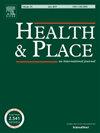Contact with nature, nature prescriptions, and loneliness: Evidence from an international survey of adults in Australia, India, Singapore, the United Kingdom, and the United States
IF 3.8
2区 医学
Q1 PUBLIC, ENVIRONMENTAL & OCCUPATIONAL HEALTH
引用次数: 0
Abstract
Evidence to support nature contact and nature prescriptions to reduce loneliness is scant. A total of 2100 individuals took part in a survey conducted in Australia (n = 525, mean age = 34.1), India (n = 526, mean age = 29.5), Singapore (n = 523, mean age = 36.1), the UK (n = 526, mean age = 37.3), and the US (n = 525, mean age = 43.6) in 2022 (overall age range 18–89yrs). Multilevel logistic regressions adjusted for confounding indicated mean levels of overall loneliness tended to be higher in India (Odds Ratio [OR] 1.21, 95% Confidence Interval [95%CI] 0.90–1.62), Singapore (OR = 1.54, 95%CI = 1.15–2.07), the UK (OR = 1.26, 95%CI = 0.96–1.67) and the US (OR = 1.24, 95%CI = 0.94–1.64) compared with Australia. Notable differences were observed by loneliness type, for example, with lower odds of social loneliness (OR = 0.57, 95%CI = 0.41–0.79) and higher odds of emotional loneliness (OR = 1.57, 95%CI = 1.14–2.06) in India compared with Australia. Findings with regards to loneliness and nature contact varied between country. In general, social loneliness was lower in participants who visited natural surroundings regularly (OR = 0.81, 95%CI = 0.61–0.98) and spent two hours or more per week in nature (OR = 0.65, 95%CI = 0.49–0.81). Overall loneliness (OR = 1.98, 95%CI = 1.48–2.47) and emotional loneliness (OR = 2.84, 95%CI = 2.13–3.51) were substantially higher among those who felt having no-one to go with was a barrier to spending time in nature. Emotional loneliness was higher in those who had more time in nature (OR = 1.32, 95%CI = 0.94–1.75) or more frequent visits (OR = 1.24, 95%CI = 0.94–1.49), which may be indicative of selective processes by which some people who feel emotionally lonely seek meaningful sources of connection or solace in natural environments. In sum, these findings highlight potentially important contingencies in how people feel lonely in different countries, and the potential of contact with nature as a means to address this critical issue of modern times. Randomised trials of nature prescription interventions for loneliness co-designed with respect to contrasting cultural, economic, and climatic contexts are needed to ensure programs intended to reconnect people with nature are effective, equitable, and acceptable for everyone.
接触自然、自然处方和孤独感:来自澳大利亚、印度、新加坡、英国和美国成年人国际调查的证据。
支持自然接触和自然处方以减少孤独感的证据并不多。2022 年,共有 2100 人参加了在澳大利亚(n = 525,平均年龄 = 34.1)、印度(n = 526,平均年龄 = 29.5)、新加坡(n = 523,平均年龄 = 36.1)、英国(n = 526,平均年龄 = 37.3)和美国(n = 525,平均年龄 = 43.6)进行的一项调查(总体年龄范围为 18-89 岁)。经混杂因素调整的多层次逻辑回归表明,与澳大利亚相比,印度(Odds Ratio [OR] 1.21,95% Confidence Interval [95%CI] 0.90-1.62)、新加坡(OR = 1.54,95%CI = 1.15-2.07)、英国(OR = 1.26,95%CI = 0.96-1.67)和美国(OR = 1.24,95%CI = 0.94-1.64)的总体孤独感平均水平往往更高。例如,与澳大利亚相比,印度的社会孤独几率较低(OR = 0.57,95%CI = 0.41-0.79),而情感孤独几率较高(OR = 1.57,95%CI = 1.14-2.06)。不同国家在孤独感和与大自然接触方面的调查结果各不相同。一般来说,经常去自然环境(OR = 0.81,95%CI = 0.61-0.98)和每周在自然环境中度过两小时或更长时间(OR = 0.65,95%CI = 0.49-0.81)的参与者的社会孤独感较低。在认为无人陪伴是在大自然中度过时间的障碍的人群中,总体孤独感(OR = 1.98,95%CI = 1.48-2.47)和情感孤独感(OR = 2.84,95%CI = 2.13-3.51)都要高得多。在大自然中度过更多时间(OR = 1.32,95%CI = 0.94-1.75)或更频繁地去大自然(OR = 1.24,95%CI = 0.94-1.49)的人中,情感孤独感更高,这可能表明了一些感到情感孤独的人在自然环境中寻求有意义的联系或慰藉的选择性过程。总之,这些研究结果凸显了不同国家的人们如何感到孤独的潜在重要偶然性,以及与自然接触作为解决现代这一关键问题的一种手段的潜力。需要对针对孤独感的自然处方干预措施进行随机试验,并根据不同的文化、经济和气候环境进行共同设计,以确保旨在重新将人们与自然联系起来的计划有效、公平,并为每个人所接受。
本文章由计算机程序翻译,如有差异,请以英文原文为准。
求助全文
约1分钟内获得全文
求助全文
来源期刊

Health & Place
PUBLIC, ENVIRONMENTAL & OCCUPATIONAL HEALTH-
CiteScore
7.70
自引率
6.20%
发文量
176
审稿时长
29 days
期刊介绍:
he journal is an interdisciplinary journal dedicated to the study of all aspects of health and health care in which place or location matters.
 求助内容:
求助内容: 应助结果提醒方式:
应助结果提醒方式:


